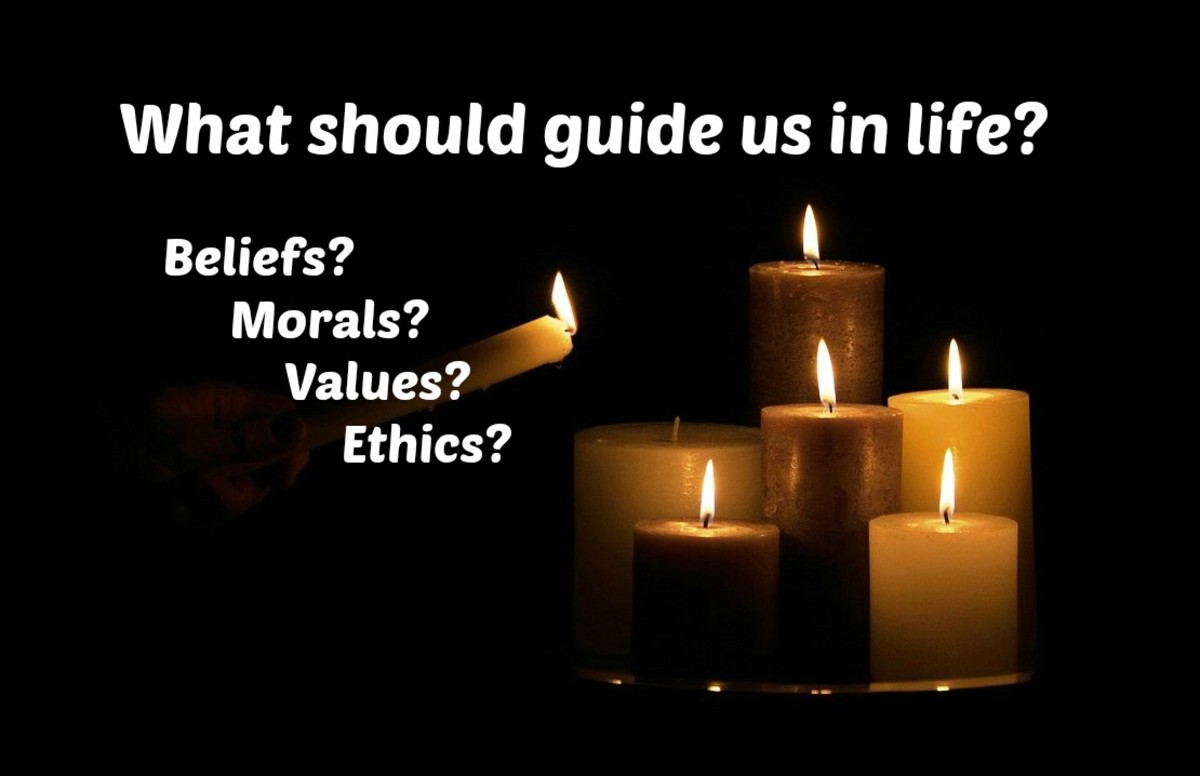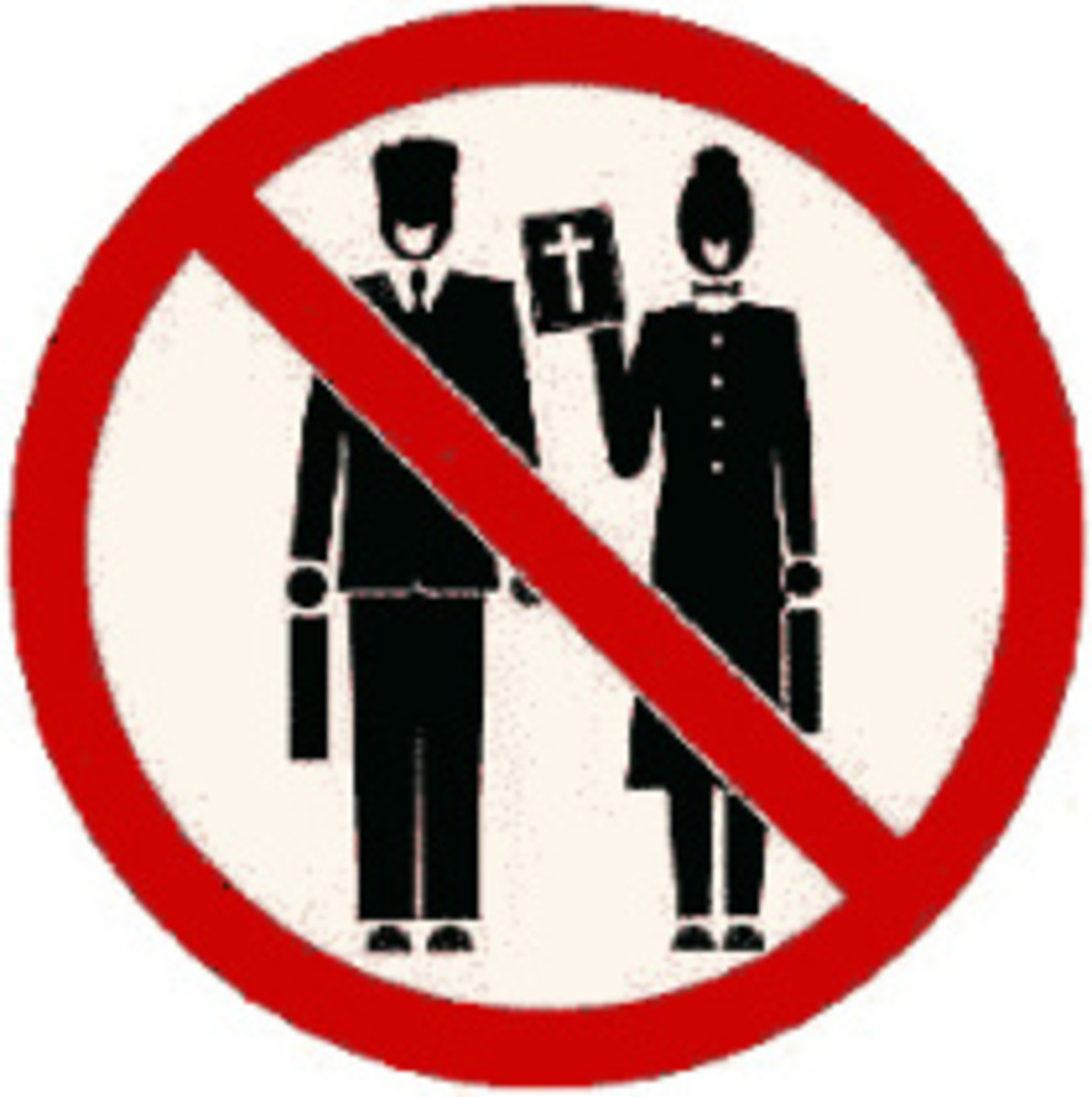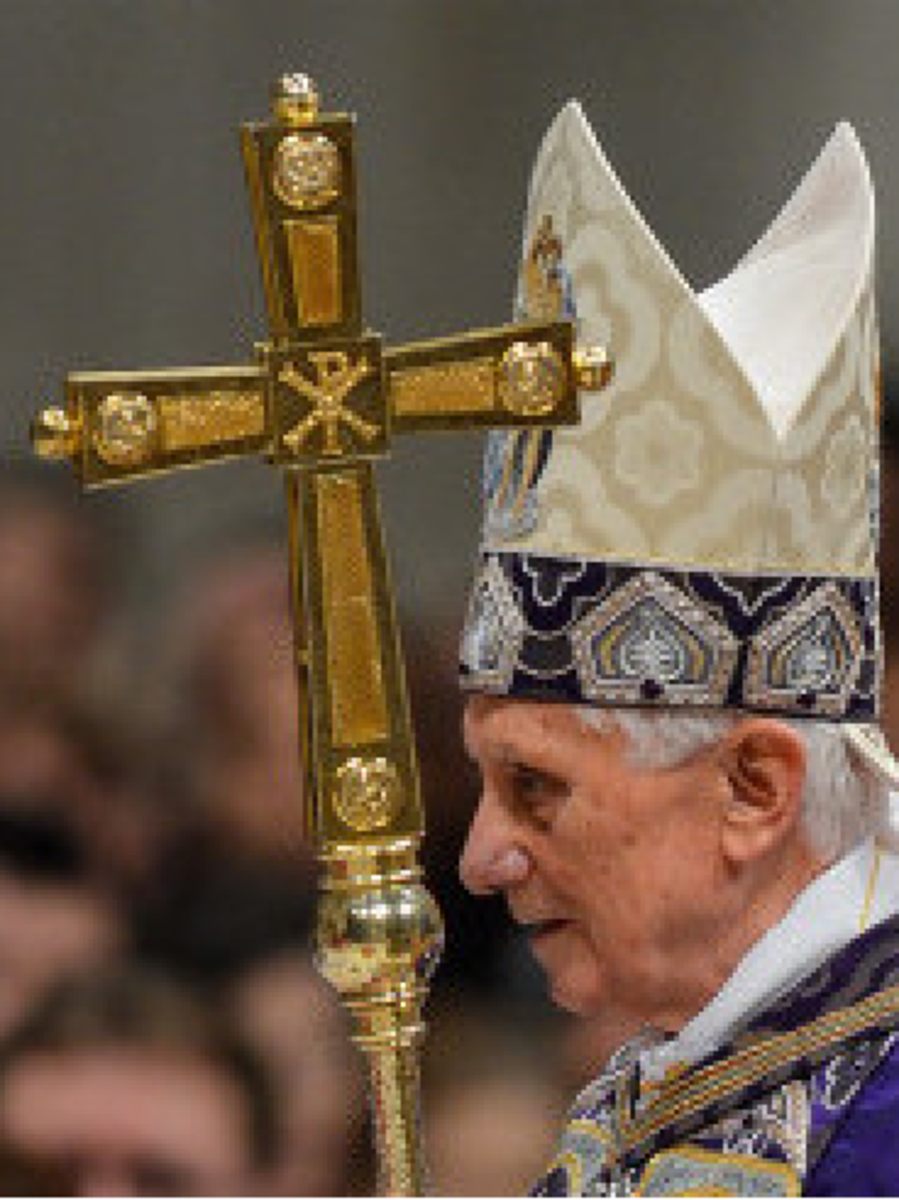The Problem with a Blessing
Figure 1
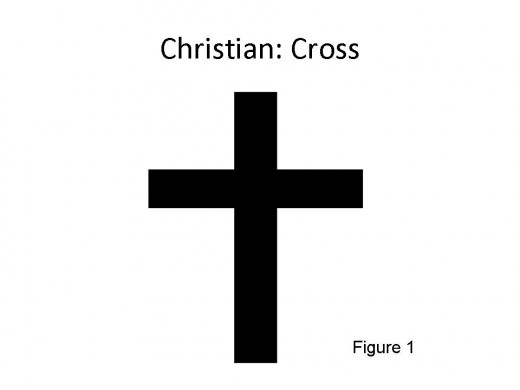
The Problem with a Blessing©
It is amazing how a tiny, apparently insignificant event can trigger a complex discussion, and unknowingly be a subset of a public debate that has been brewing in this country for over 200 years. Recently I was walking out of the local hospital and ran into a friend of mine in the parking lot. During the course of a short conversation, he inquired as to why I was there. My wife just had surgery and after a three day stay was being released to go home. We chatted about her condition and at the end of the conversation he said, “I will keep her in my prayers.” Before I could thank him, he stated, “I’m sorry; I guess that was not a very EO thing to say.” The reason for his apology was due in part by the fact I was the Equal Opportunity (EO) officer for the organization we both worked for and I do not generally make public my religious affiliation. This short exchange which served as the catalyst for this article, highlights the core of a much larger issue.
This short conversation is an example why Eduardo Mendieta (editor and translator of Jürgen Habermas’ book, Religion and Rationality: Essays on Reason, God, and Modernity) wrote in 2002, “The question of religion is once again at forefront of critical thoughts precisely because it crystallizes some of the most serious and pressing questions of contemporary social thought.” (Habermas:Page 1) The verbal exchange highlights how we continue to be polarized over the issue of religion. On the one hand my friend was saying he was aware that there is a tension between religious ideologies and he did not want to be offensive. On the other hand it demonstrates a lack of understanding of the points of contention around religion. The act that he was apologizing for is not an example of intolerance or insensitivity. A point I hope to clarify in the following passages is there is a monumental difference between bestowing a blessing or praying for someone and being intolerant to a person’s religious beliefs.
Figure 2

There should be no debate that religious intolerance exists in the world and the discussion of tolerance is not new. In 1689, John Locke wrote, A Letter Concerning Toleration, in which he was responding to the leading Remonstrant[1] theologian, Phillipp van Limborch[2], “I esteem that toleration to be the chief characteristic mark of the true Church.”(Locke) His words were strong because in that era, making statements or publicly disclosing your religious beliefs had potentially deadly consequences. Religion, because of its metaphysical nature, have associated with it extremists and today there are many examples where religious beliefs are taken to their utmost violent end. With the multitude of examples, there is no reason for this piece to focus on its existence; rather this inquiry is about why the tension exists which leads to intolerance and what can be done to counter it before it can grow into violent extremism. While most religions preach some level of tolerance, positive discourse between people with different religions beliefs remains to be difficult because of the intimate nature of the subject.
To be clear, this article is about religious tolerance, it is not about political correctness (PC). The manner in which the debate has developed the concept of PC has come to mean a shutting down of discourse, which lead my friend to worry about offering to pray for my wife. Tolerance is about keeping the lines of communication open. A barrier to open communication is an internal fear that respecting the rights of people to express their religion somehow is an infringement on their own religious freedom. A line out of a song performed by Toby Keith that highlights this point of view, “Just don’t get busted singin' Christmas carols.” (West) Mr. Keith’s song is a challenge against being PC; however it is misguided defiance. While some may not like his songs, no one is interfering with his right to present music that celebrates his religion. He can perform these songs in his church, on his albums, and have them played on the radio. His right to practice his religion is protected.
This article is not denying that there are people who want to do away with Mr. Keith's right to sing Christmas Carols. These challenges come from sources that are internal and external to the Christian ideology. The creators of the website, Let God be True, have created a list of 120 reasons why celebrating Christmas is unChristian. They use the Bible as their source document to support their claim. This same site give another 15 reason why celebrating Christmas is “Spiritual Adultery”. The public debate about religion is usually presented as Christian verse everyone else, however the issue is infinitely more complicated.
According to a 2008 report by the Pew Forum on Religion and Public Life the majority of Americans surveyed identified with some religious affiliation. (Figure 2) “Overall, nearly eight-in-ten (78.4%) adults report belonging to various forms of Christianity, about 5% belong to other faiths and almost one-in-six (16.1%) are not affiliated with any particular religion.” (Pew) Even though we are a religious nation, there is some debate as to what being religious means. A step any article should take to intelligently discuss the nature of religion is to establish a working definition of the subject. Too many arguments about religion get lost because a common understanding or a point of reference was not defined.

For a foundation this article is going to use is the definition of religon found at the website Dictionary.com:
“Religion is:
1. a set of beliefs[3] concerning the cause, nature, and purpose of the universe, especially when considered as the creation of a superhuman agency or agencies, usually involving devotional and ritual observances, and often containing a moral code governing the conduct of human affairs.
2. a specific fundamental set of beliefs and practices generally agreed upon by a number of persons or sects: the Christian religion; the Buddhist religion.
3. the body of persons adhering to a particular set of beliefs and practices: a world council of religions.” (Dictionary.com)
At the heart of this particular definition is the word belief, which is a personal assumption of truth.[4] Not just a true statement, but an everlasting Truth that transcends time and location. Everyone works within a general construct of their particular religious sect, yet each individual experiences and interprets their beliefs differently. True uniformity within a religious system does not exist, there is only similarity. Take Christianity for example, there are many mainstream sects, Catholic, Lutheran, and Methodist, to name a few, each represents fundamental differences in the way that the religion is exercised and what it means to believe in Christianity. Within each sect there are subsects that have placed their own values on the system. How the sect experiences the tenants of the religion changes depending where the devotees are geographically. Churches in the same geographic region can practice differently depending on the demographics of the congregation. Even within the same local house of worship there is dissenting interpretations of the belief. This vast array of competing belief systems cause a problem for many people, because religion is something that provides a sense of meaning and purpose to the universe. The competition to their belief system is perceived as a challenge to the stability of their lives.
Figure 4
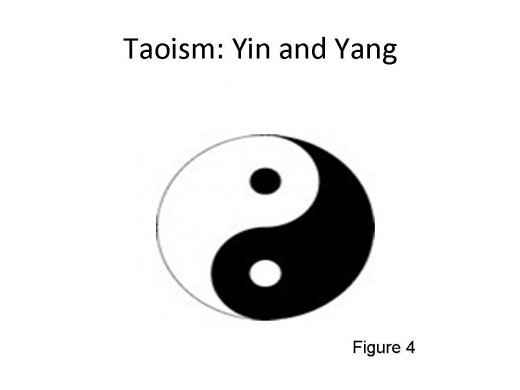
There are a number of reasons to support the claim that the offer to pray for my wife’s well being is not an example of religious intolerance. First of all, his actions were not asking me to change my views. He was giving me an indication of what his religious beliefs are without trying to impose them on me. Also you have to take into consideration the intentions of the speaker. This last point is critically important. In this situation, there was not much my friend could do in the way of help, so as a gesture of support he was going to pray for my wife. Simply stated it was an act of goodwill, with no intention of malice.
It is my contention that my friend’s gesture was appropriate for him to do in the situation as presented. However, there are times when a prayer is inappropriate. For example, on May 22, 2012, a local Delaware news sources reported, “A federal court judge ruled that Sussex County Council must stop reciting the Lord's Prayer at each council meeting begins because it violates the Constitution.” ( Fisher) A suit challenging the practice of saying the Lord’s Prayer before council meetings was brought forth by local residents the year before. This begs the question, how are the actions of the county government any different than my friend’s? As County Councilman, Sam Wilson asked, “Whatever happened to freedom of speech?” (Fisher) The difference is significant, my friend was representing himself, members of the council, while acting in an official capacity, were representing the citizens of Sussex county[5]. Serving as an official of the government does not eliminate or negate that politician’s religious beliefs. There is however a limitation on how that governmental body can express a religious belief. One simple solution is to ask for a moment of silence before each meeting to allow each person the opportunity to prayer or reflect in a manner suited to their beliefs.
Figure 5
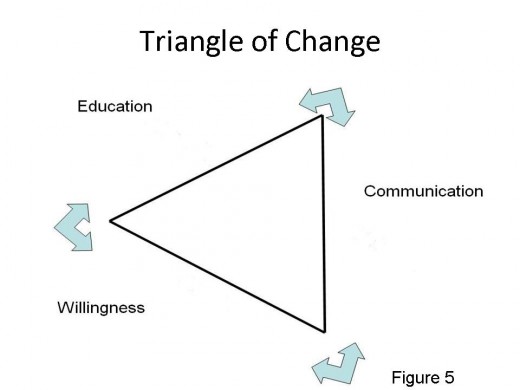
So how do we get to a place where differences can be discussed and respected, without fear? The three steps being recommended, Education, Communication and Willingness, (Figure 5) which may sound simple on the surface, but requires a great deal of effort and concentration on the part of the individual. Even people with no religious identity or affiliation need to practice these steps as a part of a society.
1. Education: Understanding the tenets of your own religion also learning about the beliefs of other religions. This requires looking at the information, not from the context of your home religion, rather from the perspective of the other religion. The understanding of others from your own perspective will be biased.
2. Communication: Talk to people, if you do not understand something ask the question. Going back to my friend who offered to pray for my wife, for the sake of argument let us assume I was offended by his action, does that make him intolerant? No, at this point neither one of us would be intolerant; our subsequent actions would determine that. I would first have to explain why I took offense to his gesture, without this step I would be denying him the opportunity to learn. I would also have to allow him the opportunity to explain why he did it, and then he is allowing me the opportunity to learn. If I demanded my friend only pray in accordance with my religious beliefs then I would be the one exhibiting signs of intolerance because I would be denying him the right to his religious beliefs. If we do not communicate the differences and the reason for the difference then understanding will be difficult to achieve. Communicating the difference does not mean trying to convert people who have a different belief system. However, a lack of communication leaves room of stereotypes, lies and misinformation to fester.
3. Willingness: There has to be a willingness to engage with people who are different. However, due to the nature of religion this is not as easy as it may sound. If a particular religious ideology represents a person’s core understanding of how the universe operates, then even acknowledging the legitimacy of a different ideology becomes a challenge.
Figure 6
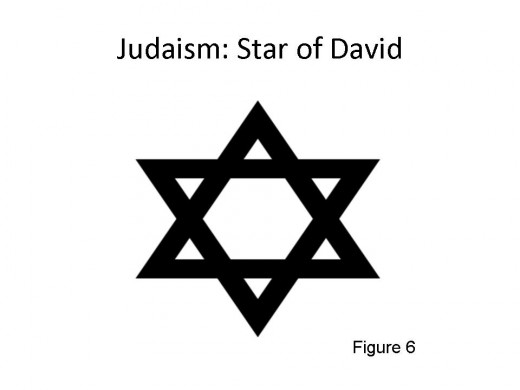
Here is the frustrating piece to this discussion; you have to expect that you are going to screw this up from time to time. You are going to say something that you did not intend to be offensive. Even when you are trying to do the right thing, I do it all the time. I am almost positive that in the course of this article I have offended a great many people. The offense may in part be due to the fact that I am open to other ways of thinking or I am challenging an established practice or I am perceived as misrepresenting this issue. When these misunderstandings happen, then go back to the three points for change. The value of diversity does not come from how well we agree with each other. The strength of diversity is derived from the manner in which we disagree. Through learning about and from others we will have a greater clarity of ourselves.
In closing I would like to refer to a letter that George Washington wrote to a Hebrew congregation in Newport R.I. “For happily the Government of the United States, which gives to bigotry no sanction, to persecution no assistance requires only that they who live under its protection should demean themselves as good citizens, in giving it on all occasions their effectual support.” (Washington) To realize President Washington’s vision for a country where all are able to practice their religious beliefs, a level of recognition, tolerance, and communication has to exist.
References and Footnotes
Footnotes:
[1] Dutch Protestants
[2] Yes I checked the spelling of his name
[3] I have highlighted and italicized
[4] This discussion also applies to Atheists
[5] For more information on my view of the separation of Church and State please see The Making of a Theocratic Society (ChurchState) at http://mark-monroe.hubpages.com/hub/The-Making-of-a-Theocratic-Society-Church-State
Sources
Dictionary.com Unabridged. Based on the Random House Dictionary, © Random House, Inc. 2013. Religion. http://dictionary.reference.com/browse/religion. (access May 19, 2012)
Fisher, James. Judge silences Sussex County Council's prayer. Delmarvanow.com.http://www.delmarvanow.com/article/20120522/DW01/205220309/Judge-silences-Sussex-County-Council-s-prayer. May 22,2012 (Accessed June 14, 2012)
Habermas, Jürgen, edited and translated by Eduardo Mendieta. Religion and Rationality: Essays on Reason, God, and Modernity. The MIT Press. 2002
Let God be True. 120 Reasons Against Christmas. http://www.letgodbetrue.com/bible/holidays/christmas.php. (accessed November 23, 2013)
Locke, John. A Letter Concerning Toleration. Prepared for the University of Virginia Library Electronic Text Center. 2002. Originally published 1689. http://etext.lib.virginia.edu/toc/modeng/public/LocTole.html. (Accessed June 5, 2012)
Pew Forum on Religion and Public Life. U.S. Religious Landscape Survey: Religious Affiliation: Diverse and Dynamic: Chapter 1. http://religions.pewforum.org/reports#. February 2008 (accessed June 15, 2012)
Washington, George. To the Hebrew Congregation in Newport, Rhode Island. http://gwpapers.virginia.edu/documents/hebrew/reply.html . 18 August 1790 (Accessed June 14, 2012)
West, Joe, Dave Pahanish. Performed by Toby Keith. American Ride. Show Dog-Universal Music. 2009
Images
Source of Figure 3. The Pew Forum on Religion and Public Life. U.S. Religious Landscape Survey: Religious Affiliation: Diverse and Dynamic: Chapter 1
Source of Figures 1, 2, 4, and 6 http://en.wikipedia.org/wiki/Religious_symbolism. (Accessed June 20, 2012)
© 2012 Mark Monroe


